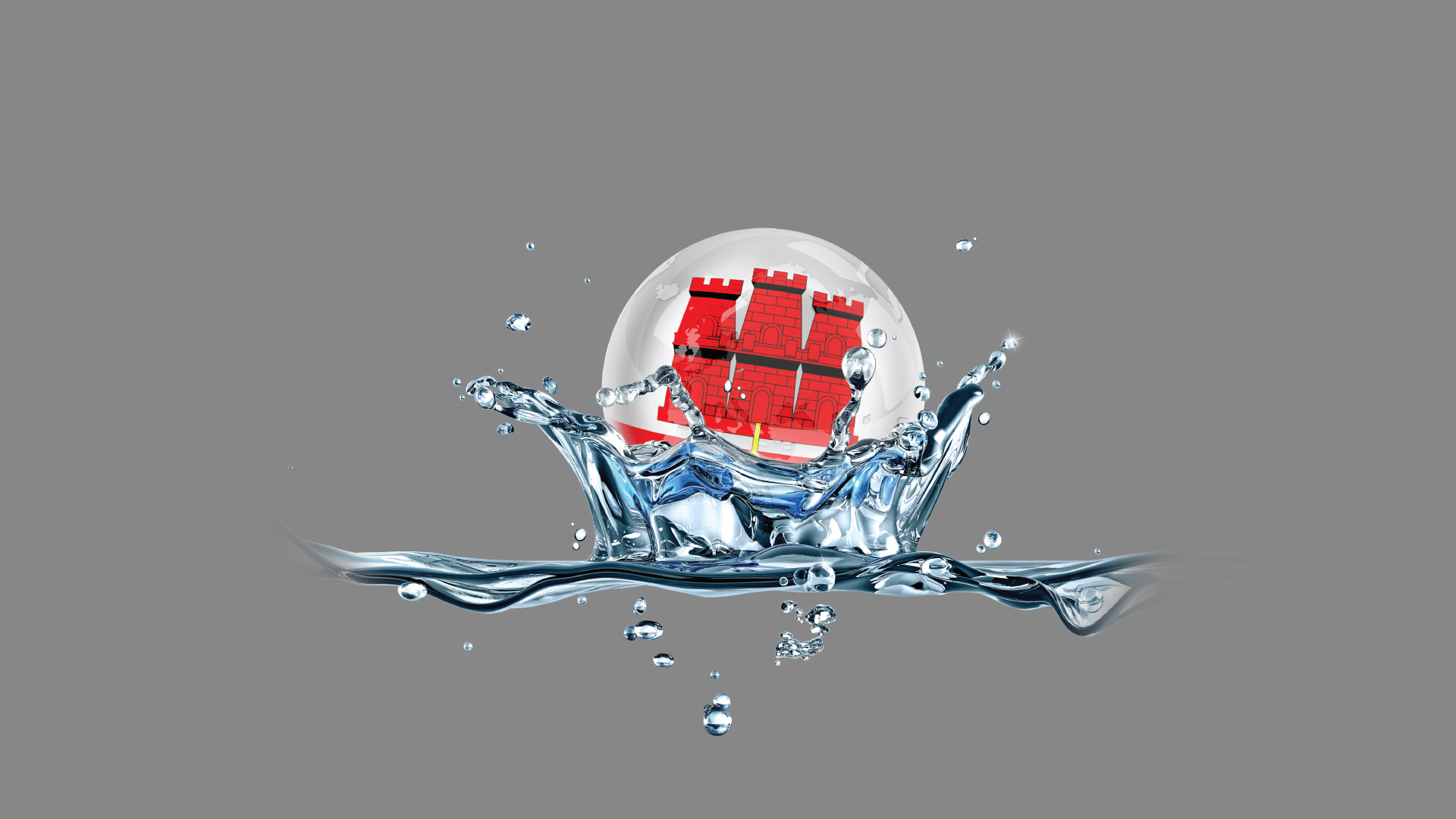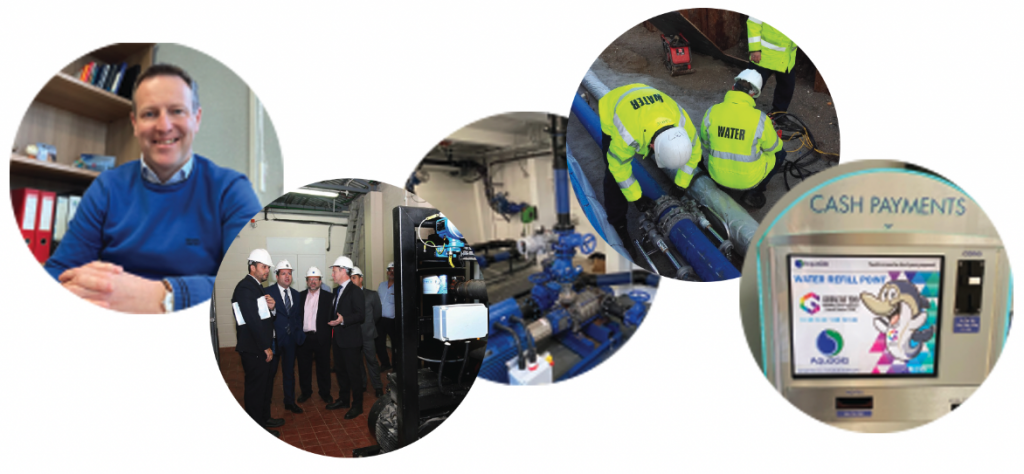Paul Singleton, Managing Director of AquaGib since 2013, leads a team of just over one hundred employees who are dedicated to their core service which is the supply and distribution of Gibraltar’s water. “Because the main sewer is at Line Wall Road level and most of the residential property is below the main sewer level, we also run the operation and maintenance of the twenty plus sewage pumping stations which pump the sewage into the main sewer before it travels down to Europa Point,” he explains.
Historically, ground water was collected in wells and rainwater was collected on the catchments on the east side of the Rock, but they have been out of commission for a long time now and all the water for Gibraltar is now produced by desalination, also known as Reverse Osmosis (RO).
“We have two pumping sites, one in the North Mole area and the other down at Governor’s Cottage, and we take the sea water, pass it through membranes which produces fresh water and then we pump it to the reservoirs up in the Rock from where it is distributed by gravity down to the public,” Paul states. Reverse Osmosis, although it sounds complicated is in reality an easily explained process. “Basically it is just the passing of sea water through a very fine filter that removes everything in the water, down to beyond Nano level.”
Regarding quantities, Paul says that AquaGib produces somewhere between 5,000 and 6,000 metres cubed per day. “Our theoretical maximum is about 2 million metres cubed a year and we currently supply about 1.7 million metres cubed per year of fresh water and 1.5 million metres cubed per year of saltwater.”
Customer service is paramount in AquaGib and Paul confirms that they are customer focused. “We like to have relationships with our customers and to look after them,” he says. “Our senior manager in charge of customer services is always trying to find innovative way of saving his team time by generating new ways of paying, but also by trying to be a bit more personal about how we have that interaction with our customers.”
One of these innovations is that now when you call AquaGib you will be placed on hold and treated to local music by local artists. “We had previously had some negative interaction about our on-hold music and this has proved to be a great idea and one that has been really positively received.”
Something else that will make life easier for customers is the installation of a self-service payment kiosk at the Cashiers Office on the ground floor at Leanse Place. “We pride ourselves on trying to provide as many different ways for people to pay as possible and now they can do so by simply scanning the QR code that is printed on their bills.” Currently only cash is being accepted at the kiosk, although a card payment option is coming soon. “From a coronavirus perspective it was essential that our staff did not handle cash due to the possibility of transmitting the virus so we had to close our Cashiers Office under Public Health advice,” explains Paul. “With the self-service payment kiosk, we are now able to efficiently tackle these unforeseen new challenges and reduce the need for slower face-to-face interaction.”
During the initial lockdown period last year, AquaGib had to clarify a controversy over high water bills, explaining in a detailed statement at the time that June bills were based on accurate meter readings that reflected usage over the whole lockdown period and not just that month alone. “I don’t think people realise that we read most of the meters every month and that they are charged on their actual usage,” Paul states. “During lockdown we took meter readers off the streets as a way of reducing potential transmission of coronavirus, so we stopped reading meters and we started estimating, and obviously people here are not used to having meters estimated.” Confusion arose because due to factors such as washing of hands etc., water consumption was higher than usual for some consumers. “That is the downside of estimating not being an exact science – but it was all resolved and nobody paid for anything that they didn’t use.”
Plans for the future include introducing smart meters in the next three to five years and Paul confirms that they already have some trial smart meter environments in Gibraltar in places such as Rock Gardens and in certain areas in Marina Bay. “At the moment we are testing the capability of how they read – they mainly communicate with the cloud via mobile phone signals so they tend to be 3G and 4G – but that’s not conducive to working in some of our meter rooms, many of which tend to be at the bottom of buildings or in concrete boxes where the mobile signal is not perfect, so we need to make sure that works throughout Gibraltar.” There are 20,000 water meters in Gibraltar at the moment, so changing all those to smart metering is not going to be an overnight process. In keeping with AquaGib’s commitment to the environment, smart metering will go some way towards educating consumers to use water more efficiently because they will be able to see how they use their water on a daily basis.
With new developments constantly being built around Gibraltar, how does AquaGib cope with the increase in water usage? Paul clarifies that there are two aspects to this. “Firstly, we have to make sure that we have enough water for everybody which means investing in new Reverse Osmosis plants, and we are looking at doing this in the next year to eighteen months which will increase our capacity by 25%.” There are also operational issues in making sure that the water that is needed can get to the sites so that they can produce and pour the concrete, and that involves careful liaison from the Water Networks Team. “Sometimes it means replacing small pipes with bigger diameter pipes or installing new pipes so that they can carry more water, ensuring that there is no impact on supplying a site.”
“We try to stay ahead of the curve and in that respect being part of the building application process helps because it means that we get advance warning of all these developments, but there is always stuff that catches us by surprise and suddenly we have to think how we best supply them with the water they need.”
Paul says that the Government is committed to making sure that the water supply from AquaGib is throughout the whole of Gibraltar. “In certain parts of Gibraltar water was once supplied by the MOD, so until that land is handed back there are certain areas where essentially Government doesn’t have a network, so consequently AquaGib doesn’t have a network.” There are still some places where it is just supplied by the MOD and where sometimes AquaGib customers are on MOD water mains. “In that situation we have a water transfer agreement with the MOD whereby an AquaGib customer uses MOD water and we then transfer the water back,” he states.
Looking forward, Paul says that from his perspective the company will be building for the future to ensure that AquaGib is a great business that has longevity. “It is about making sure that our supply is sustainable and Reverse Osmosis, whilst it is a very efficient way of producing water, is power hungry so electrical efficiency is key.” He goes on to explain that AquaGib has reduced the amount of electricity per metre cubed over the last five years by about 25 – 30% by investing in new power efficient pumps. “That’s vital because electricity is a resource that is expensive and we want to be as efficient when we use our electricity as everybody else wants to be, and that means updating infrastructure and making sure the most efficient pumps are in place, making sure that we have got general water supply and investing in a new RO plant – that is a significant investment.” The last RO plant was bought in 2011, bringing the number up to five. “We are looking to invest in a sixth – which will mean another 20/30% of water being able to be produced which will see us through for another ten or fifteen years – and that is taking up a lot of our time right now.”
Having Northumbrian Water as a shareholder in AquaGib allows the company to use their knowledge and expertise, which would otherwise cost a fortune in consultancy services. “Having them as a parent company is really important to us,” Paul comments. “As an example, if we suddenly want to do something such as implementing a sustainability report we are able to go to Northumbrian Water and ask them how they do theirs.”
Paul explains that the Government of Gibraltar is both their primary customer and shareholder and as such they have a very good relationship and are involved on a day-to-day-basis with them. “We work hand-in-hand to supply water to Gibraltar and from their perspective the water supply is hardy and sustainable and is doing what it is supposed to do.”
Public awareness and education is a huge part of the water company’s ethos and in this respect Water Production Director Chris Gomez goes into schools and organises visits to Reverse Osmosis plants and to the reservoirs.
Water is one of the most important substances on earth, and as demonstrated by their motto, AquaGib is ‘committed to your life source’. “Unfortunately interruptions are a necessary evil,” Paul says. “Pipes do sometimes burst and need to be replaced on occasion, but we try desperately to make sure any interruptions are minimised and affect as few people as possible and we always try to provide the best possible service to our customers.”









